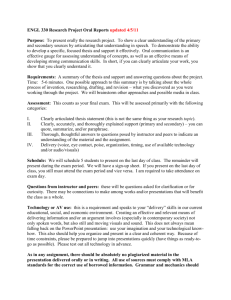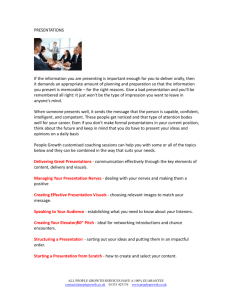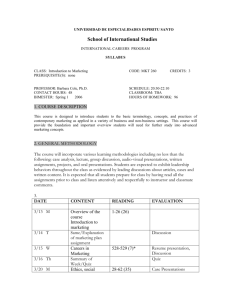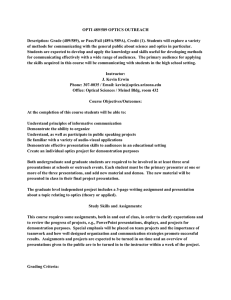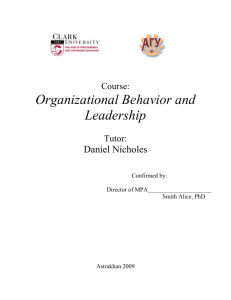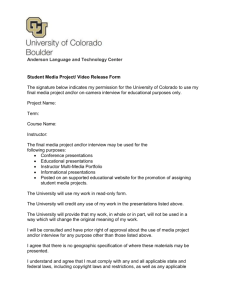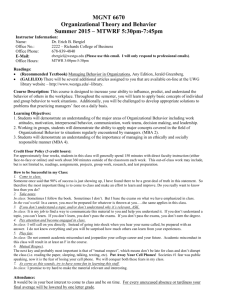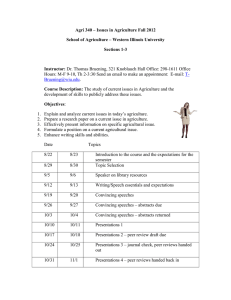File
advertisement
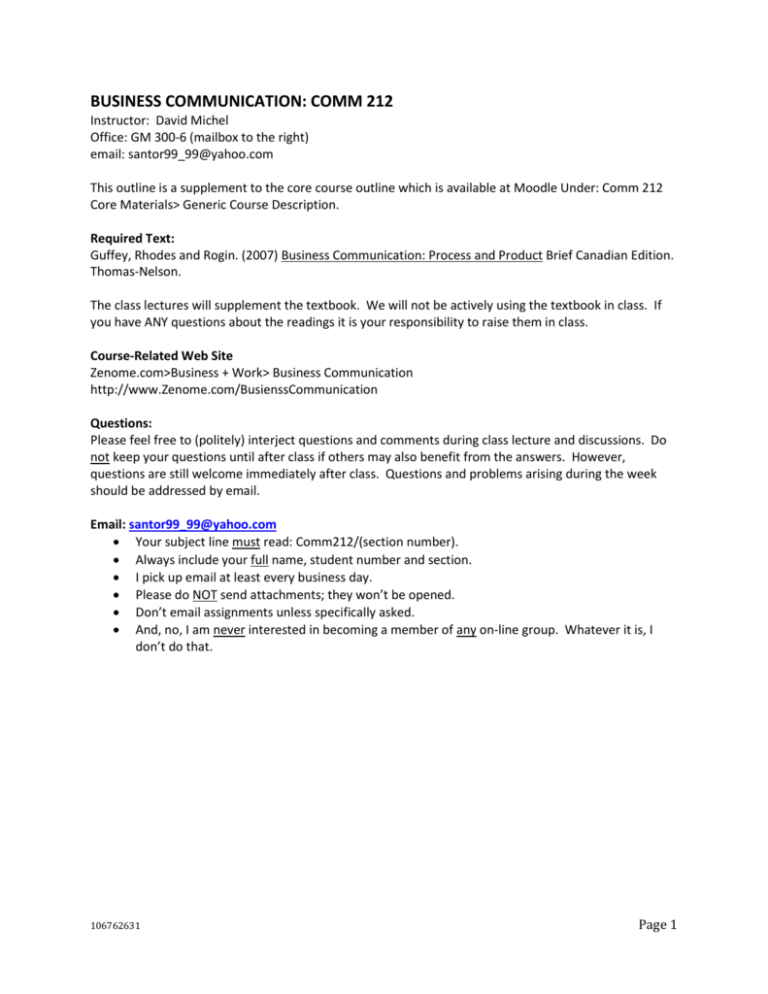
BUSINESS COMMUNICATION: COMM 212 Instructor: David Michel Office: GM 300-6 (mailbox to the right) email: santor99_99@yahoo.com This outline is a supplement to the core course outline which is available at Moodle Under: Comm 212 Core Materials> Generic Course Description. Required Text: Guffey, Rhodes and Rogin. (2007) Business Communication: Process and Product Brief Canadian Edition. Thomas-Nelson. The class lectures will supplement the textbook. We will not be actively using the textbook in class. If you have ANY questions about the readings it is your responsibility to raise them in class. Course-Related Web Site Zenome.com>Business + Work> Business Communication http://www.Zenome.com/BusienssCommunication Questions: Please feel free to (politely) interject questions and comments during class lecture and discussions. Do not keep your questions until after class if others may also benefit from the answers. However, questions are still welcome immediately after class. Questions and problems arising during the week should be addressed by email. Email: santor99_99@yahoo.com Your subject line must read: Comm212/(section number). Always include your full name, student number and section. I pick up email at least every business day. Please do NOT send attachments; they won’t be opened. Don’t email assignments unless specifically asked. And, no, I am never interested in becoming a member of any on-line group. Whatever it is, I don’t do that. 106762631 Page 1 ASSIGNMENTS Each assignment will be discussed in detail when it is assigned. Hand-outs and Questions will follow. 1. First Oral Presentation Topic: “Who I am and why you should want me in your group “ Duration: 2 minutes (max), no visuals, 10% Due: Week 3 2. Group Project: Topics will be assigned. You will start with a specific topic in communicating within organizations, research it and build a web-site to help others who may be interested in learning about it. You will then present it to the class. Much more information will be provided. Groups of 5, Web site to be submitted by Week 10. Presentations to the class on Week 10. 25% 3. Proposal: You must formally propose a topic for your solo oral presentation at the end of the semester. It can be any topic relevant to Business Communication. If you are unsure about your topic, speak to me before you start to write. Length 300-500 Words, due Week 8. 5% 4. Second Oral Presentation: You must research the topic from Assignment No. 3 in accordance with what is stipulated in your proposal. You will present your findings to the class in an oral presentation at the end of the semester. Length: 4 minutes (max), A/V aids optional, due on Week 12 or 13. 15% 5. Formal Report: You must write a formal report charting your career course. Research the field in which you hope to work. Much information will be provided on how to do this. It is up to you to make this assignment useful to yourself. Length: 1000-1200 words, format to be provided, due Week 13. 20% 6. Test: During the examination period, there will be a multiple choice test based exclusively on the text book Business Communication: Process and Product by Guffy, Rhodes & Rogin (2007). You are responsible for the entire contents of the book. Time: TBA (during exam period) 25% Grading: A copy of the applicable Concordia scale will be appended to this outline and is available in your student handbook. One full letter grade (i.e. A+ to B+) will be deducted if a paper is late. After more than one week, the paper will not be accepted. The group assignment and oral presentations will not be accepted late. Oral presentation cannot be read to the audience. If you read most of your presentation, the highest mark possible will be a C. Unless otherwise specified all assignments must be submitted on paper, typed, and doublespaced. If an assignment has clearly not been spell checked or proofread it will directly affect your grade, or it may be returned ungraded. 106762631 Page 2 Any grade you wish to contest must be addressed to the instructor in writing at santor99_99@yahoo.com one week of receiving the graded assignment. You should be specific and have a genuine case. If you are not content with the results of this, you may continue the appeal process formally (but you must discuss it with your instructor first). This means filling out a form from Administration which will allow another instructor to evaluate your work. Your mark may go up, go down or remain the same. Plagiarism is the illegal and unethical use of other people’s ideas and words without giving proper formal credit. Read up on the university policy in the student handbook or elsewhere. This is a serious problem and will result in a grade of “F” for the assignment and/or the course. Don’t try to plagiarize in this course. General Information: You must have access to an email address within the first two weeks of class. You will also be required to access the Web. Always keep a copy of every assignment you submit. Keep a copy of all graded assignments (with grade attached) in case there are any questions regarding your final grade. This is a safety precaution for your protection. Please feel free to approach me if you have any special needs or circumstances that will hinder your success in this course. I will be happy to help if I can. Schedule Class 1 Class 2 Class 3 Class 4 Class 5 Class 6 Class 7 Class 8 Class 9 Class 10 Class 11 Class 12 Class 13 Introduction to Communicating in Organizations Speaking to an Audience Oral Presentation (2 minutes) “Who I am and why you should want me in your group” 2 minutes (max), no visuals, 10% Groups formed Group Project assigned Visuals in Presentation Group Time Writing for the Media Proposal Assigned Group Time Resumes Interviews & Applications Proposals due (5%) Audience Analysis Group Presentations (Part 1) Project due (25%) Group Presentations (Part 2) Individual Oral Presentation (Part 1) 15% Individual Oral Presentation (Part 2) 15% Reports due (20%) This schedule is subject to change 106762631 Page 3
